新视野第二册B2U3孝道翻译讲解稿.
新视野英语第二册课文翻译
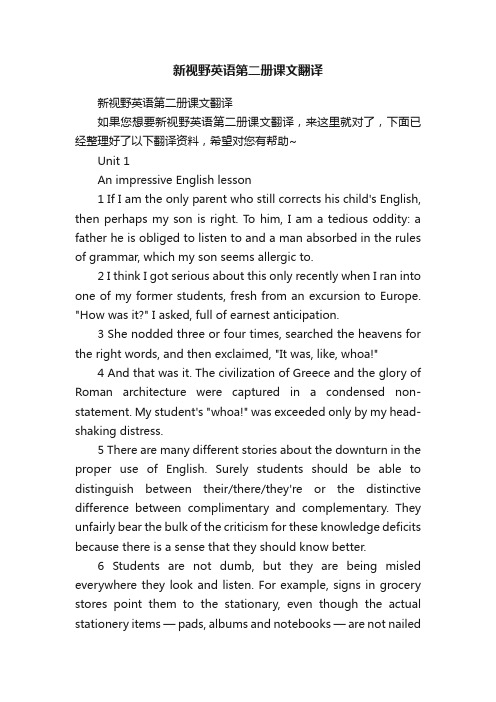
新视野英语第二册课文翻译新视野英语第二册课文翻译如果您想要新视野英语第二册课文翻译,来这里就对了,下面已经整理好了以下翻译资料,希望对您有帮助~Unit 1An impressive English lesson1 If I am the only parent who still corrects his child's English, then perhaps my son is right. To him, I am a tedious oddity: a father he is obliged to listen to and a man absorbed in the rules of grammar, which my son seems allergic to.2 I think I got serious about this only recently when I ran into one of my former students, fresh from an excursion to Europe. "How was it?" I asked, full of earnest anticipation.3 She nodded three or four times, searched the heavens for the right words, and then exclaimed, "It was, like, whoa!"4 And that was it. The civilization of Greece and the glory of Roman architecture were captured in a condensed non-statement. My student's "whoa!" was exceeded only by my head-shaking distress.5 There are many different stories about the downturn in the proper use of English. Surely students should be able to distinguish between their/there/they're or the distinctive difference between complimentary and complementary. They unfairly bear the bulk of the criticism for these knowledge deficits because there is a sense that they should know better.6 Students are not dumb, but they are being misled everywhere they look and listen. For example, signs in grocery stores point them to the stationary, even though the actual stationery items — pads, albums and notebooks — are not naileddown. Friends and loved ones often proclaim they've just ate when, in fact, they've just eaten. Therefore, it doesn't make any sense to criticize our students.7 Blame for the scandal of this language deficit should be thrust upon our schools, which should be setting high standards of English language proficiency. Instead, they only teach a little grammar and even less advanced vocabulary. Moreover, the younger teachers themselves evidently have little knowledge of these vital structures of language because they also went without exposure to them. Schools fail to adequately teach the essential framework of language, accurate grammar and proper vocabulary, while they should take the responsibility of pushing the young onto the path of competent communication.8 Since grammar is boring to most of the young students, I think that it must be handled delicately, step by step. The chance came when one day I was driving with my son. As we set out on our trip, he noticed a bird in jerky flight and said, "It's flying so unsteady." I carefully asked, "My son, how is the bird flying?" "What's wrong? Did I say anything incorrectly?" He got lost. "Great! You said incorrectly instead of incorrect. We use adverbs to describe verbs. Therefore, it's flying so unsteadily but not so unsteady."9 Curious about my correction, he asked me what an adverb was. Slowly, I said, "It's a word that tells you something about a verb." It led to his asking me what a verb was. I explained, "Verbs are action words; for example, Dad drives the truck. Drive is the verb because it's the thing Dad is doing."10 He became attracted to the idea of action words, so we listed a few more: fly, swim, dive, run. Then, out of his own curiosity, he asked me if other words had names for their use andfunctions. This led to a discussion of nouns, adjectives, and articles. Within the span of a 10-minute drive, he had learned from scratch to the major parts of speech in a sentence. It was painless learning and great fun!11 Perhaps, language should be looked upon as a road map and a valuable possession: often study the road map (check grammar) and tune up the car engine (adjust vocabulary). Learning grammar and a good vocabulary is just like driving witha road map in a well-conditioned car.12 The road map provides the framework and guidance you need for your trip, but it won't tell you exactly what trees or flowers you will see, what kind of people you will encounter, or what types of feelings you will be experiencing on your journey. Here, the vocabulary makes the journey's true colors come alive!A good vocabulary enables you to enjoy whatever you see as you drive along. Equipped with grammar and a good vocabulary, you have flexibility and excellent control. While the road map guides your journey to your destination, an excellent vehicle helps you to fully enjoy all of the sights, sounds and experiences along the way.13 Effective, precise, and beneficial communication depends upon grammar and a good vocabulary, the two essential assets for students, but they are not being taught in schools.14 Just this morning, my son and I were eating breakfast when I attempted to add milk to my tea. "Dad," he said, "If I were you, I wouldn't do that. It's sour."15 "Oh my!" I said, swelling with pride toward my son, "That'sa grammatically perfect sentence. You used were instead of was."16 "I know, I know," he said with a long agreeable sigh. "It's the subjunctive mood."17 I was, like, whoa!Translation一堂难忘的英语课1 如果我是唯一一个还在纠正小孩英语的家长,那么我儿子也许是对的。
新视野大学英语(第三版)第二册翻译题参考答案unit3

新视野三版读写2U3翻译讲解Part1As an important part of the American culture value system,"individualism"is admired by most American people.作为美国文化价值体系的一个重要组成部分,"个人主义"受到大多数美国人的推崇。
Americans view the family as a group whose primary purpose is to advance the happiness of individual members.美国人认为家庭作为一个群体,其主要目的是促进家庭各成员的幸福。
In contrast to many other cultures,the primary responsibility of the American family member is not to advance the family as a group,either socially or economically.与许多其他文化相比,美国家庭成员的主要职责,不是在社会上或经济上提高整个家庭的地位。
What would be best for the family is not usually considered to be as important as what would be best for the individual.人们通常认为,什么是对个人最好的要比什么是对家庭最好的更为重要。
With freedom comes the responsibility to care for oneself,for it is the freedom of choice that carries with it the responsibility:to accept the consequences of the choices.与自由相伴而来的是照顾自己的责任,因为所选择的自由承载了责任,即必须接受自己的选择所带来的后果。
新视野大学英语第三版读写教程第二册课后翻译答案
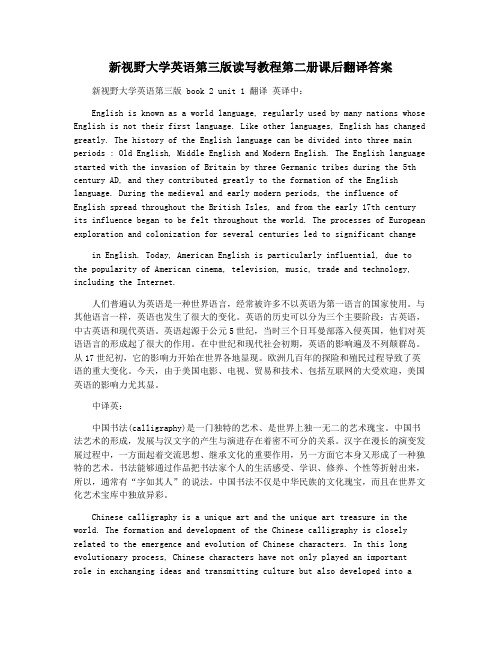
新视野大学英语第三版读写教程第二册课后翻译答案新视野大学英语第三版 book 2 unit 1 翻译英译中:English is known as a world language, regularly used by many nations whose English is not their first language. Like other languages, English has changed greatly. The history of the English language can be divided into three main periods : Old English, Middle English and Modern English. The English language started with the invasion of Britain by three Germanic tribes during the 5th century AD, and they contributed greatly to the formation of the English language. During the medieval and early modern periods, the influence of English spread throughout the British Isles, and from the early 17th century its influence began to be felt throughout the world. The processes of European exploration and colonization for several centuries led to significant changein English. Today, American English is particularly influential, due to the popularity of American cinema, television, music, trade and technology, including the Internet.人们普遍认为英语是一种世界语言,经常被许多不以英语为第一语言的国家使用。
新视野大学英语(第三版)读写教程第二册课文翻译(全册)-大学英语读写教程翻译
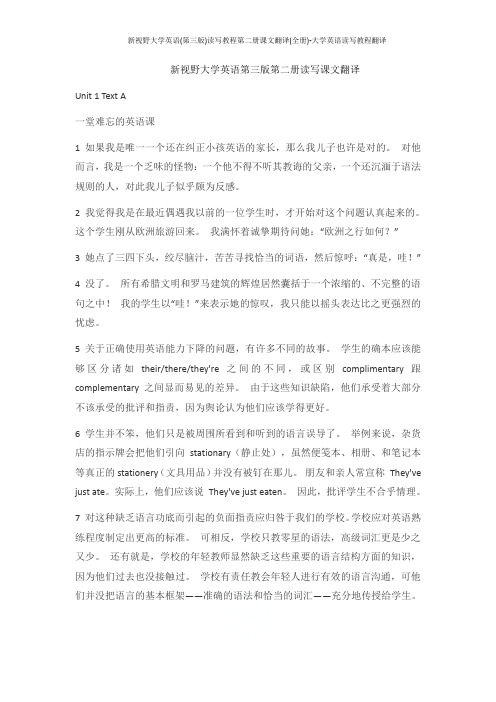
新视野大学英语第三版第二册读写课文翻译Unit 1 Text A一堂难忘的英语课1 如果我是唯一一个还在纠正小孩英语的家长,那么我儿子也许是对的。
对他而言,我是一个乏味的怪物:一个他不得不听其教诲的父亲,一个还沉湎于语法规则的人,对此我儿子似乎颇为反感。
2 我觉得我是在最近偶遇我以前的一位学生时,才开始对这个问题认真起来的。
这个学生刚从欧洲旅游回来。
我满怀着诚挚期待问她:“欧洲之行如何?”3 她点了三四下头,绞尽脑汁,苦苦寻找恰当的词语,然后惊呼:“真是,哇!”4 没了。
所有希腊文明和罗马建筑的辉煌居然囊括于一个浓缩的、不完整的语句之中!我的学生以“哇!”来表示她的惊叹,我只能以摇头表达比之更强烈的忧虑。
5 关于正确使用英语能力下降的问题,有许多不同的故事。
学生的确本应该能够区分诸如their/there/they're之间的不同,或区别complimentary 跟complementary之间显而易见的差异。
由于这些知识缺陷,他们承受着大部分不该承受的批评和指责,因为舆论认为他们应该学得更好。
6 学生并不笨,他们只是被周围所看到和听到的语言误导了。
举例来说,杂货店的指示牌会把他们引向stationary(静止处),虽然便笺本、相册、和笔记本等真正的stationery(文具用品)并没有被钉在那儿。
朋友和亲人常宣称They've just ate。
实际上,他们应该说They've just eaten。
因此,批评学生不合乎情理。
7 对这种缺乏语言功底而引起的负面指责应归咎于我们的学校。
学校应对英语熟练程度制定出更高的标准。
可相反,学校只教零星的语法,高级词汇更是少之又少。
还有就是,学校的年轻教师显然缺乏这些重要的语言结构方面的知识,因为他们过去也没接触过。
学校有责任教会年轻人进行有效的语言沟通,可他们并没把语言的基本框架——准确的语法和恰当的词汇——充分地传授给学生。
8 因为语法对大多数年轻学生而言枯燥且乏味,所以我觉得讲授语法得一步一步、注重技巧地进行。
新视野第三版大学英语第二册课文翻译

新视野大学英语第二册读写教程课文翻译Unit 1 Text A An impressive Engli lsesson标题: 一堂难忘的英语课1. 如果我是唯一一个还在纠正小孩英语的家长,那么我儿子也许是对的。
对他而言,我是一个乏味的怪物:一个他不得不听其教诲的父亲,一个还沉湎于语法规则的人,对此我儿子似乎颇为反感。
2. 我觉得我是在最近偶遇我以前的一位学生时,才开始对这个问题认真起来的。
这个学生刚从欧洲旅游回来。
我满怀着诚挚期待问她:“欧洲之行如何?”3. 她点了三四下头,绞尽脑汁,苦苦寻找恰当的词语,然后惊呼:“真是,哇!”4. 没了。
所有希腊文明和罗马建筑的辉煌居然囊括于一个浓缩的、不完整的语句之中!我的学生以“哇!”来表示她的惊叹,我只能以摇头表达比之更强烈的忧虑。
5. 关于正确使用英语能力下降的问题,有许多不同的故事。
学生的确本应该能够区分诸如 their/there/they're 之间的不同,或区别 complimentary 跟complementary 之间显而易见的差异。
由于这些知识缺陷,他们承受着大部分不该承受的批评和指责,因为舆论认为他们应该学得更好。
6. 学生并不笨,他们只是被周围所看到和听到的语言误导了。
举例来说,杂货店的指示牌会把他们引向 stationary(静止处),虽然便笺本、相册、和笔记本等真正的stationery(文具用品)并没有被钉在那儿。
朋友和亲人常宣称 They've just ate。
实际上,他们应该说 They've just eaten。
因此,批评学生不合乎清理。
7. 对这种缺乏语言功底而引起的负面指责应归咎于我们的学校。
学校应对英语熟练程度制定出更高的标准。
可相反,学校只教零星的语法,高级词汇更是少之又少。
还有就是,学校的年轻教师显然缺乏这些重要的语言结构方面的知识,因为他们过去也没接触过。
学校有责任教会年轻人进行有效的语言沟通,可他们并没把语言的基本框架一一准确的语法和恰当的词汇一一充分地传授给学生。
新视野大学英语第三版第二册第三单元B2U3

Step 1 Watch the GIF and discuss the following question in pairs.
What major stages does one’s life include?
— Boris Kodjoe
Parents can only give good advice or put their children on the right paths, but the final forming of a person’s character lies in their own hands.
— Anne Frank
Project of the unit
பைடு நூலகம்
Inspiring your Enhancing
thoughts
your skills
Project forecasting
Lead-in
Presenting your project
Project of the unit
Lead-in
• infancy • childhood • adolescence • adulthood • middle age
Project of the unit
Lead-in
Step 2 Work in groups and discuss the following questions.
1) Which stage are you at now? The stage between adolescence and adulthood.
The odyssey years (3/3)
新视野大学英语第三版Book2课后翻译
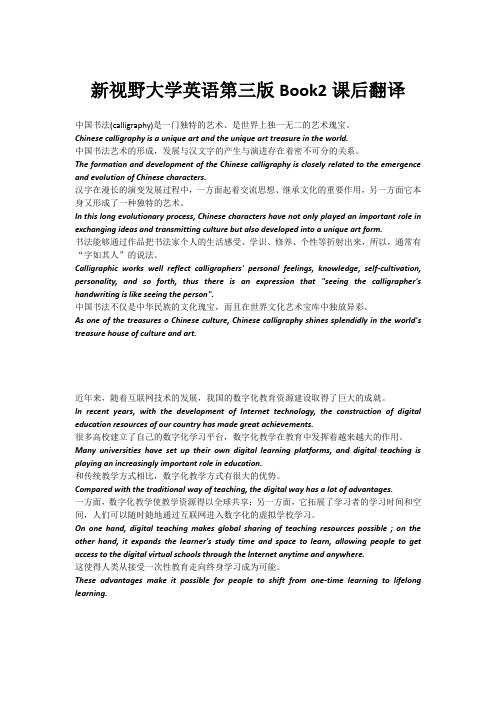
新视野大学英语第三版Book2课后翻译中国书法(calligraphy)是一门独特的艺术、是世界上独一无二的艺术瑰宝。
Chinese calligraphy is a unique art and the unique art treasure in the world.中国书法艺术的形成,发展与汉文字的产生与演进存在着密不可分的关系。
The formation and development of the Chinese calligraphy is closely related to the emergence and evolution of Chinese characters.汉字在漫长的演变发展过程中,一方面起着交流思想、继承文化的重要作用,另一方面它本身又形成了一种独特的艺术。
In this long evolutionary process, Chinese characters have not only played an important role in exchanging ideas and transmitting culture but also developed into a unique art form.书法能够通过作品把书法家个人的生活感受、学识、修养、个性等折射出来,所以,通常有“字如其人”的说法。
Calligraphic works well reflect calligraphers' personal feelings, knowledge, self-cultivation, personality, and so forth, thus there is an expression that "seeing the calligrapher's handwriting is like seeing the person".中国书法不仅是中华民族的文化瑰宝,而且在世界文化艺术宝库中独放异彩。
新视野大学英语(第三版)第二册课后翻译答案及原文
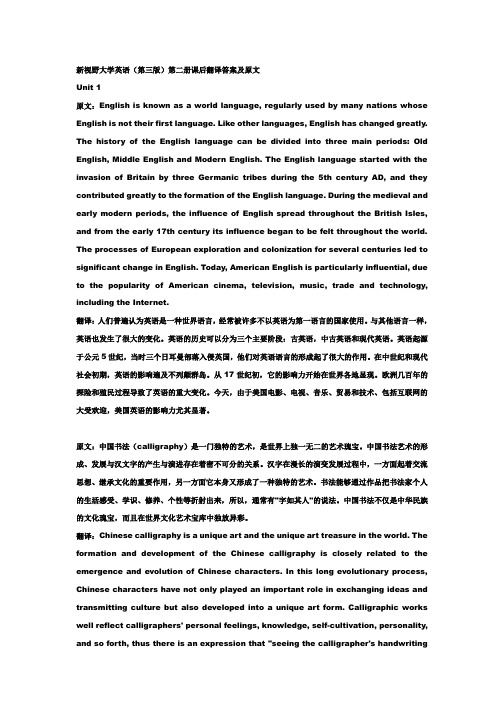
新视野大学英语(第三版)第二册课后翻译答案及原文Unit 1原文:English is known as a world language, regularly used by many nations whose English is not their first language. Like other languages, English has changed greatly. The history of the English language can be divided into three main periods: Old English, Middle English and Modern English. The English language started with the invasion of Britain by three Germanic tribes during the 5th century AD, and they contributed greatly to the formation of the English language. During the medieval and early modern periods, the influence of English spread throughout the British Isles, and from the early 17th century its influence began to be felt throughout the world. The processes of European exploration and colonization for several centuries led to significant change in English. Today, American English is particularly influential, due to the popularity of American cinema, television, music, trade and technology, including the Internet.翻译:人们普遍认为英语是一种世界语言,经常被许多不以英语为第一语言的国家使用。
新视野大学英语读写教程(第三版)Book2Unit3课文讲解
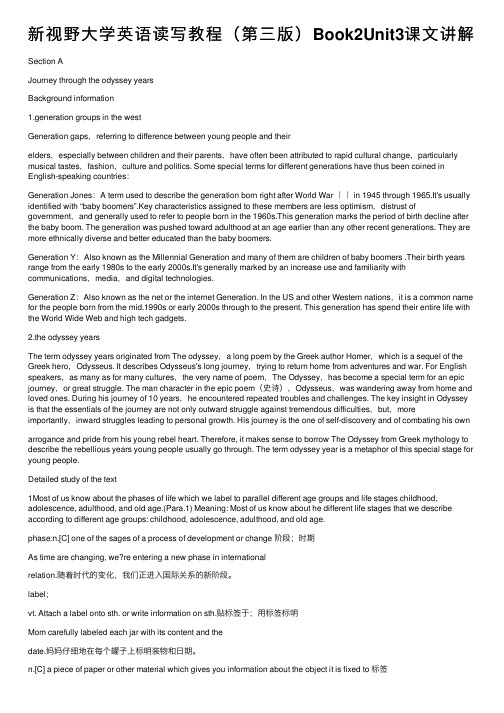
新视野⼤学英语读写教程(第三版)Book2Unit3课⽂讲解Section AJourney through the odyssey yearsBackground information1.generation groups in the westGeneration gaps,referring to difference between young people and theirelders,especially between children and their parents,have often been attributed to rapid cultural change,particularly musical tastes,fashion,culture and politics. Some special terms for different generations have thus been coined in English-speaking countries:Generation Jones:A term used to describe the generation born right after World War || in 1945 through 1965.It's usually identified with “baby boomers”.Key characteristics assigned to these members are less optimism,distrust of government,and generally used to refer to people born in the 1960s.This generation marks the period of birth decline after the baby boom. The generation was pushed toward adulthood at an age earlier than any other recent generations. They are more ethnically diverse and better educated than the baby boomers.Generation Y:Also known as the Millennial Generation and many of them are children of baby boomers .Their birth years range from the early 1980s to the early 2000s.It's generally marked by an increase use and familiarity with communications,media,and digital technologies.Generation Z:Also known as the net or the internet Generation. In the US and other Western nations,it is a common name for the people born from the mid.1990s or early 2000s through to the present. This generation has spend their entire life with the World Wide Web and high tech gadgets.2.the odyssey yearsThe term odyssey years originated from The odyssey,a long poem by the Greek author Homer,which is a sequel of the Greek hero,Odysseus. It describes Odysseus's long journey,trying to return home from adventures and war. For English speakers,as many as for many cultures,the very name of poem,The Odyssey,has become a special term for an epic journey,or great struggle. The man character in the epic poem(史诗),Odysseus,was wandering away from home and loved ones. During his journey of 10 years,he encountered repeated troubles and challenges. The key insight in Odyssey is that the essentials of the journey are not only outward struggle against tremendous difficulties,but,more importantly,inward struggles leading to personal growth. His journey is the one of self-discovery and of combating his own arrogance and pride from his young rebel heart. Therefore, it makes sense to borrow The Odyssey from Greek mythology to describe the rebellious years young people usually go through. The term odyssey year is a metaphor of this special stage for young people.Detailed study of the text1Most of us know about the phases of life which we label to parallel different age groups and life stages childhood, adolescence, adulthood, and old age.(Para.1) Meaning: Most of us know about he different life stages that we describe according to different age groups: childhood, adolescence, adulthood, and old age.phase:n.[C] one of the sages of a process of development or change 阶段;时期As time are changing, we?re entering a new phase in internationalrelation.随着时代的变化,我们正进⼊国际关系的新阶段。
新视野大学英语第三版读写教程第二册课文翻译(全)

新视野大学英语第二册读写教程课文翻译Unit 1 Text A An impressive English Lesson标题: 一堂难忘的英语课1. 如果我是唯一一个还在纠正小孩英语的家长,那么我儿子也许是对的。
对他而言,我是一个乏味的怪物:一个他不得不听其教诲的父亲,一个还沉湎于语法规则的人,对此我儿子似乎颇为反感。
2. 我觉得我是在最近偶遇我以前的一位学生时,才开始对这个问题认真起来的。
这个学生刚从欧洲旅游回来。
我满怀着诚挚期待问她:“欧洲之行如何?”3. 她点了三四下头,绞尽脑汁,苦苦寻找恰当的词语,然后惊呼:“真是,哇!”4. 没了。
所有希腊文明和罗马建筑的辉煌居然囊括于一个浓缩的、不完整的语句之中!我的学生以“哇!”来表示她的惊叹,我只能以摇头表达比之更强烈的忧虑。
5. 关于正确使用英语能力下降的问题,有许多不同的故事。
学生的确本应该能够区分诸如their/there/they're 之间的不同,或区别complimentary 跟complementary 之间显而易见的差异。
由于这些知识缺陷,他们承受着大部分不该承受的批评和指责,因为舆论认为他们应该学得更好。
6. 学生并不笨,他们只是被周围所看到和听到的语言误导了。
举例来说,杂货店的指示牌会把他们引向stationary(静止处),虽然便笺本、相册、和笔记本等真正的stationery (文具用品)并没有被钉在那儿。
朋友和亲人常宣称They've just ate。
实际上,他们应该说They've just eaten。
因此,批评学生不合乎清理。
7. 对这种缺乏语言功底而引起的负面指责应归咎于我们的学校。
学校应对英语熟练程度制定出更高的标准。
可相反,学校只教零星的语法,高级词汇更是少之又少。
还有就是,学校的年轻教师显然缺乏这些重要的语言结构方面的知识,因为他们过去也没接触过。
学校有责任教会年轻人进行有效的语言沟通,可他们并没把语言的基本框架一一准确的语法和恰当的词汇一一充分地传授给学生。
新视野大学英语读写教程(第二版)第二册课文翻译
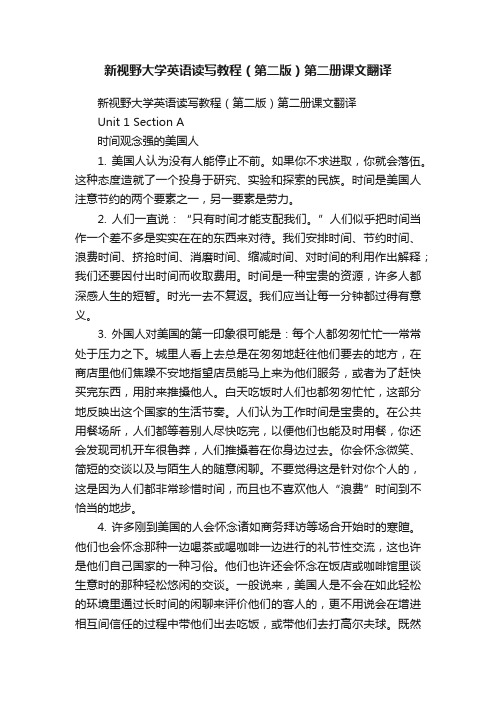
新视野大学英语读写教程(第二版)第二册课文翻译新视野大学英语读写教程(第二版)第二册课文翻译Unit 1 Section A时间观念强的美国人1. 美国人认为没有人能停止不前。
如果你不求进取,你就会落伍。
这种态度造就了一个投身于研究、实验和探索的民族。
时间是美国人注意节约的两个要素之一,另一要素是劳力。
2. 人们一直说:“只有时间才能支配我们。
”人们似乎把时间当作一个差不多是实实在在的东西来对待。
我们安排时间、节约时间、浪费时间、挤抢时间、消磨时间、缩减时间、对时间的利用作出解释;我们还要因付出时间而收取费用。
时间是一种宝贵的资源,许多人都深感人生的短暂。
时光一去不复返。
我们应当让每一分钟都过得有意义。
3. 外国人对美国的第一印象很可能是:每个人都匆匆忙忙──常常处于压力之下。
城里人看上去总是在匆匆地赶往他们要去的地方,在商店里他们焦躁不安地指望店员能马上来为他们服务,或者为了赶快买完东西,用肘来推搡他人。
白天吃饭时人们也都匆匆忙忙,这部分地反映出这个国家的生活节奏。
人们认为工作时间是宝贵的。
在公共用餐场所,人们都等着别人尽快吃完,以便他们也能及时用餐,你还会发现司机开车很鲁莽,人们推搡着在你身边过去。
你会怀念微笑、简短的交谈以及与陌生人的随意闲聊。
不要觉得这是针对你个人的,这是因为人们都非常珍惜时间,而且也不喜欢他人“浪费”时间到不恰当的地步。
4. 许多刚到美国的人会怀念诸如商务拜访等场合开始时的寒暄。
他们也会怀念那种一边喝茶或喝咖啡一边进行的礼节性交流,这也许是他们自己国家的一种习俗。
他们也许还会怀念在饭店或咖啡馆里谈生意时的那种轻松悠闲的交谈。
一般说来,美国人是不会在如此轻松的环境里通过长时间的闲聊来评价他们的客人的,更不用说会在增进相互间信任的过程中带他们出去吃饭,或带他们去打高尔夫球。
既然我们通常是通过工作而不是社交来评估和了解他人,我们就开门见山地谈正事。
因此,时间老是在我们心中滴滴答答地响着。
新视野英语第二版第二册课后翻译讲课稿

新视野英语第二版第二册课后翻译Unit 11. 房子着火了,里面的人面临着死亡的危险。
(in danger of)The house was on fireand the people inside were in danger of losing their lives. 2. 他买不起这么好的房子。
(afford to do)He cannot afford tobuy such a nice house.3. 这个主意听起来也许有些怪,不过还真有点道理。
(make sense)Although this idea maysound strange, it does make sense.4. 约翰看起来是个好人。
即便如此,我还是不信任他。
(even so)John seems (to be) anice person. Even so, I don’t trust him.5. Even though thefirst McDonald’s restaurant sold only hamburgers and French fries, it stillbecame a cultural symbol.虽说第一家麦当劳餐馆只售汉堡包和薯条,它还是成为了一种文化象征。
6. These people areangry that the building is now in danger of being destroyed, along with theirmemories.这些人想到餐馆连同他们的美好回忆一起将被摧毁,感到很气愤。
7. They are using theearthquake as an excuse.他们在利用那次地震作借口。
8. S ome think thatMcDonald’s real reason for wanting to close down the restaurant has nothing todo with money.有人认为麦当劳想关闭这家餐馆的真正原因与金钱无关。
新视野第三版大学英语第二册课文翻译
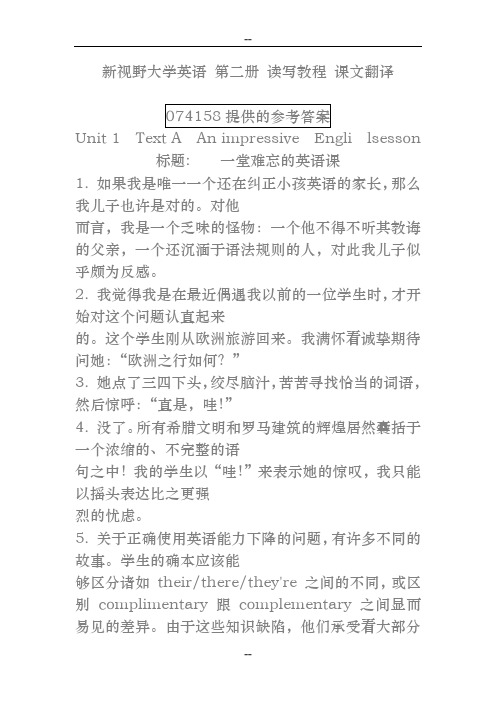
新视野大学英语第二册读写教程课文翻译Unit 1 lsesson 标题: 一堂难忘的英语课1. 如果我是唯一一个还在纠正小孩英语的家长,那么我儿子也许是对的。
对他而言,我是一个乏味的怪物:一个他不得不听其教诲的父亲,一个还沉湎于语法规则的人,对此我儿子似乎颇为反感。
2. 我觉得我是在最近偶遇我以前的一位学生时,才开始对这个问题认真起来的。
这个学生刚从欧洲旅游回来。
我满怀着诚挚期待问她:“欧洲之行如何?”3. 她点了三四下头,绞尽脑汁,苦苦寻找恰当的词语,然后惊呼:“真是,哇!”4. 没了。
所有希腊文明和罗马建筑的辉煌居然囊括于一个浓缩的、不完整的语句之中!我的学生以“哇!”来表示她的惊叹,我只能以摇头表达比之更强烈的忧虑。
5. 关于正确使用英语能力下降的问题,有许多不同的故事。
学生的确本应该能够区分诸如their/there/they're 之间的不同,或区别complimentary 跟complementary 之间显而易见的差异。
由于这些知识缺陷,他们承受着大部分不该承受的批评和指责,因为舆论认为他们应该学得更好。
6. 学生并不笨,他们只是被周围所看到和听到的语言误导了。
举例来说,杂货店的指示牌会把他们引向stationary(静止处),虽然便笺本、相册、和笔记本等真正的stationery(文具用品)并没有被钉在那儿。
朋友和亲人常宣称They've just ate。
实际上,他们应该说They've just eaten。
因此,批评学生不合乎清理。
7. 对这种缺乏语言功底而引起的负面指责应归咎于我们的学校。
学校应对英语熟练程度制定出更高的标准。
可相反,学校只教零星的语法,高级词汇更是少之又少。
还有就是,学校的年轻教师显然缺乏这些重要的语言结构方面的知识,因为他们过去也没接触过。
学校有责任教会年轻人进行有效的语言沟通,可他们并没把语言的基本框架一一准确的语法和恰当的词汇一一充分地传授给学生。
新视野大学英语读写教程(第二版)第二册课文及翻译 2解析
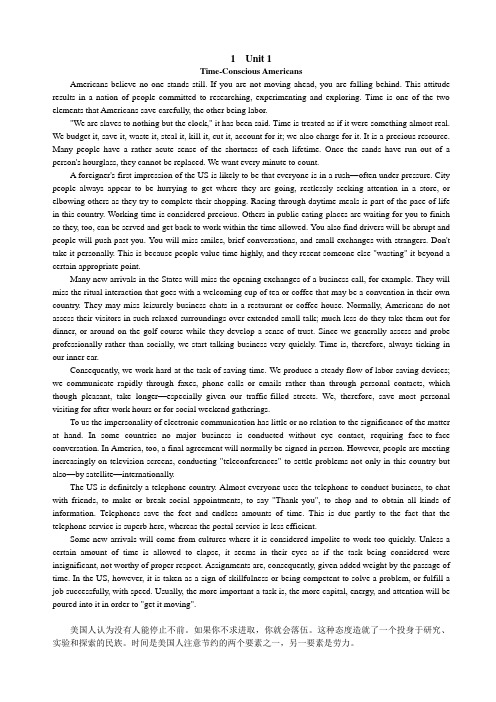
1 Unit 1Time-Conscious AmericansAmericans believe no one stands still. If you are not moving ahead, you are falling behind. This attitude results in a nation of people committed to researching, experimenting and exploring. Time is one of the two elements that Americans save carefully, the other being labor."We are slaves to nothing but the clock," it has been said. Time is treated as if it were something almost real. We budget it, save it, waste it, steal it, kill it, cut it, account for it; we also charge for it. It is a precious resource. Many people have a rather acute sense of the shortness of each lifetime. Once the sands have run out of a person's hourglass, they cannot be replaced. We want every minute to count.A foreigner's first impression of the US is likely to be that everyone is in a rush—often under pressure. City people always appear to be hurrying to get where they are going, restlessly seeking attention in a store, or elbowing others as they try to complete their shopping. Racing through daytime meals is part of the pace of life in this country. Working time is considered precious. Others in public eating-places are waiting for you to finish so they, too, can be served and get back to work within the time allowed. You also find drivers will be abrupt and people will push past you. You will miss smiles, brief conversations, and small exchanges with strangers. Don't take it personally. This is because people value time highly, and they resent someone else "wasting" it beyond a certain appropriate point.Many new arrivals in the States will miss the opening exchanges of a business call, for example. They will miss the ritual interaction that goes with a welcoming cup of tea or coffee that may be a convention in their own country. They may miss leisurely business chats in a restaurant or coffee house. Normally, Americans do not assess their visitors in such relaxed surroundings over extended small talk; much less do they take them out for dinner, or around on the golf course while they develop a sense of trust. Since we generally assess and probe professionally rather than socially, we start talking business very quickly. Time is, therefore, always ticking in our inner ear.Consequently, we work hard at the task of saving time. We produce a steady flow of labor-saving devices; we communicate rapidly through faxes, phone calls or emails rather than through personal contacts, which though pleasant, take longer—especially given our traffic-filled streets. We, therefore, save most personal visiting for after-work hours or for social weekend gatherings.To us the impersonality of electronic communication has little or no relation to the significance of the matter at hand. In some countries no major business is conducted without eye contact, requiring face-to-face conversation. In America, too, a final agreement will normally be signed in person. However, people are meeting increasingly on television screens, conducting "teleconferences" to settle problems not only in this country but also—by satellite—internationally.The US is definitely a telephone country. Almost everyone uses the telephone to conduct business, to chat with friends, to make or break social appointments, to say "Thank you", to shop and to obtain all kinds of information. Telephones save the feet and endless amounts of time. This is due partly to the fact that the telephone service is superb here, whereas the postal service is less efficient.Some new arrivals will come from cultures where it is considered impolite to work too quickly. Unless a certain amount of time is allowed to elapse, it seems in their eyes as if the task being considered were insignificant, not worthy of proper respect. Assignments are, consequently, given added weight by the passage of time. In the US, however, it is taken as a sign of skillfulness or being competent to solve a problem, or fulfill a job successfully, with speed. Usually, the more important a task is, the more capital, energy, and attention will be poured into it in order to "get it moving".美国人认为没有人能停止不前。
新视野大学英语读写教程(第二版)第二册课文及翻译
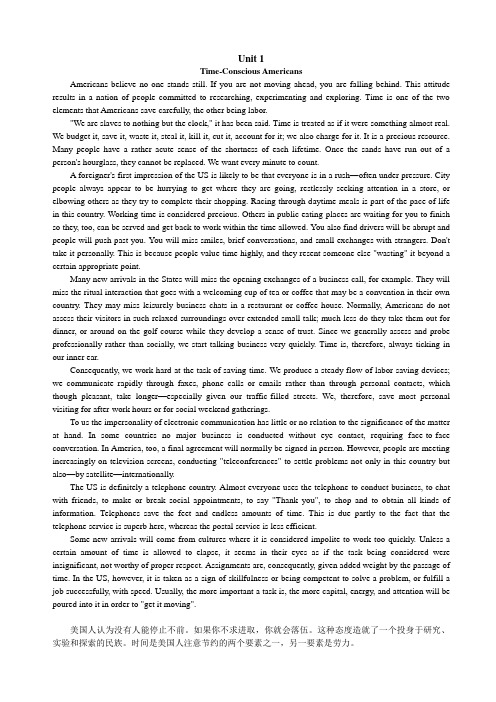
Unit 1Time-Conscious AmericansAmericans believe no one stands still. If you are not moving ahead, you are falling behind. This attitude results in a nation of people committed to researching, experimenting and exploring. Time is one of the two elements that Americans save carefully, the other being labor."We are slaves to nothing but the clock," it has been said. Time is treated as if it were something almost real. We budget it, save it, waste it, steal it, kill it, cut it, account for it; we also charge for it. It is a precious resource. Many people have a rather acute sense of the shortness of each lifetime. Once the sands have run out of a person's hourglass, they cannot be replaced. We want every minute to count.A foreigner's first impression of the US is likely to be that everyone is in a rush—often under pressure. City people always appear to be hurrying to get where they are going, restlessly seeking attention in a store, or elbowing others as they try to complete their shopping. Racing through daytime meals is part of the pace of life in this country. Working time is considered precious. Others in public eating-places are waiting for you to finish so they, too, can be served and get back to work within the time allowed. You also find drivers will be abrupt and people will push past you. You will miss smiles, brief conversations, and small exchanges with strangers. Don't take it personally. This is because people value time highly, and they resent someone else "wasting" it beyond a certain appropriate point.Many new arrivals in the States will miss the opening exchanges of a business call, for example. They will miss the ritual interaction that goes with a welcoming cup of tea or coffee that may be a convention in their own country. They may miss leisurely business chats in a restaurant or coffee house. Normally, Americans do not assess their visitors in such relaxed surroundings over extended small talk; much less do they take them out for dinner, or around on the golf course while they develop a sense of trust. Since we generally assess and probe professionally rather than socially, we start talking business very quickly. Time is, therefore, always ticking in our inner ear.Consequently, we work hard at the task of saving time. We produce a steady flow of labor-saving devices; we communicate rapidly through faxes, phone calls or emails rather than through personal contacts, which though pleasant, take longer—especially given our traffic-filled streets. We, therefore, save most personal visiting for after-work hours or for social weekend gatherings.To us the impersonality of electronic communication has little or no relation to the significance of the matter at hand. In some countries no major business is conducted without eye contact, requiring face-to-face conversation. In America, too, a final agreement will normally be signed in person. However, people are meeting increasingly on television screens, conducting "teleconferences" to settle problems not only in this country but also—by satellite—internationally.The US is definitely a telephone country. Almost everyone uses the telephone to conduct business, to chat with friends, to make or break social appointments, to say "Thank you", to shop and to obtain all kinds of information. Telephones save the feet and endless amounts of time. This is due partly to the fact that the telephone service is superb here, whereas the postal service is less efficient.Some new arrivals will come from cultures where it is considered impolite to work too quickly. Unless a certain amount of time is allowed to elapse, it seems in their eyes as if the task being considered were insignificant, not worthy of proper respect. Assignments are, consequently, given added weight by the passage of time. In the US, however, it is taken as a sign of skillfulness or being competent to solve a problem, or fulfill a job successfully, with speed. Usually, the more important a task is, the more capital, energy, and attention will be poured into it in order to "get it moving".美国人认为没有人能停止不前。
新视野第二册课文翻译(共5篇)

新视野第二册课文翻译(共5篇)第一篇:新视野第二册课文翻译新视野第二册课文翻译第一单元美国人认为没有人能停止不前。
如果你不求进取,你就会落伍。
这种态度造就了一个投身于研究、实验和探索的民族。
时间是美国人注意节约的两个要素之一,另一要素是劳力。
人们一直说:“只有时间才能支配我们。
”人们似乎把时间当作一个差不多是实实在在的东西来对待。
我们安排时间、节约时间、浪费时间、挤抢时间、消磨时间、缩减时间、对时间的利用作出解释;我们还要因付出时间而收取费用。
时间是一种宝贵的资源,许多人都深感人生的短暂。
时光一去不复返。
我们应当让每一分钟都过得有意义。
外国人对美国的第一印象很可能是:每个人都匆匆忙忙──常常处于压力之下。
城里人看上去总是在匆匆地赶往他们要去的地方,在商店里他们焦躁不安地指望店员能马上来为他们服务,或者为了赶快买完东西,用肘来推搡他人。
白天吃饭时人们也都匆匆忙忙,这部分地反映出这个国家的生活节奏。
人们认为工作时间是宝贵的。
在公共用餐场所,人们都等着别人尽快吃完,以便他们也能及时用餐,你还会发现司机开车很鲁莽,人们推搡着在你身边过去。
你会怀念微笑、简短的交谈以及与陌生人的随意闲聊。
不要觉得这是针对你个人的,这是因为人们都非常珍惜时间,而且也不喜欢他人“浪费”时间到不恰当的地步。
许多刚到美国的人会怀念诸如商务拜访等场合开始时的寒暄。
他们也会怀念那种一边喝茶或喝咖啡一边进行的礼节性交流,这也许是他们自己国家的一种习俗。
他们也许还会怀念在饭店或咖啡馆里谈生意时的那种轻松悠闲的交谈。
一般说来,美国人是不会在如此轻松的环境里通过长时间的闲聊来评价他们的客人的,更不用说会在增进相互间信任的过程中带他们出去吃饭,或带他们去打高尔夫球。
既然我们通常是通过工作而不是社交来评估和了解他人,我们就开门见山地谈正事。
因此,时间老是在我们心中滴滴答答地响着。
因此,我们千方百计地节约时间。
我们发明了一系列节省劳力的装置;我们通过发传真、打电话或发电子邮件与他人迅速地进行交流,而不是通过直接接触。
新视野大学英语读写教程第二册课文翻译
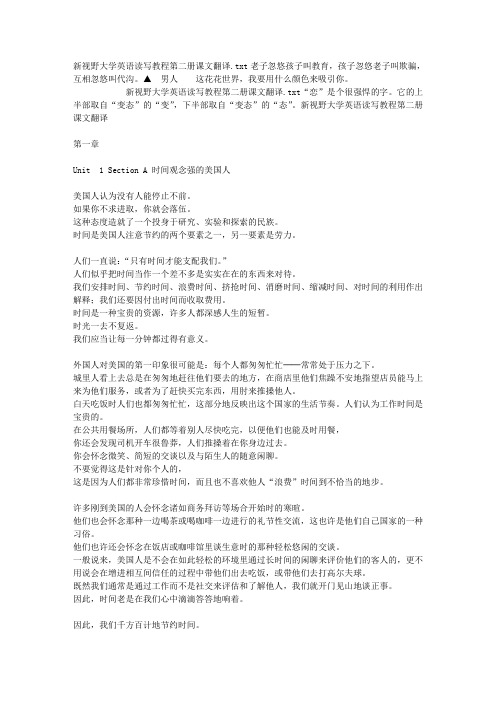
新视野大学英语读写教程第二册课文翻译.txt老子忽悠孩子叫教育,孩子忽悠老子叫欺骗,互相忽悠叫代沟。
▲男人这花花世界,我要用什么颜色来吸引你。
新视野大学英语读写教程第二册课文翻译.txt“恋”是个很强悍的字。
它的上半部取自“变态”的“变”,下半部取自“变态”的“态”。
新视野大学英语读写教程第二册课文翻译第一章Unit 1 Section A 时间观念强的美国人美国人认为没有人能停止不前。
如果你不求进取,你就会落伍。
这种态度造就了一个投身于研究、实验和探索的民族。
时间是美国人注意节约的两个要素之一,另一要素是劳力。
人们一直说:“只有时间才能支配我们。
”人们似乎把时间当作一个差不多是实实在在的东西来对待。
我们安排时间、节约时间、浪费时间、挤抢时间、消磨时间、缩减时间、对时间的利用作出解释;我们还要因付出时间而收取费用。
时间是一种宝贵的资源,许多人都深感人生的短暂。
时光一去不复返。
我们应当让每一分钟都过得有意义。
外国人对美国的第一印象很可能是:每个人都匆匆忙忙──常常处于压力之下。
城里人看上去总是在匆匆地赶往他们要去的地方,在商店里他们焦躁不安地指望店员能马上来为他们服务,或者为了赶快买完东西,用肘来推搡他人。
白天吃饭时人们也都匆匆忙忙,这部分地反映出这个国家的生活节奏。
人们认为工作时间是宝贵的。
在公共用餐场所,人们都等着别人尽快吃完,以便他们也能及时用餐,你还会发现司机开车很鲁莽,人们推搡着在你身边过去。
你会怀念微笑、简短的交谈以及与陌生人的随意闲聊。
不要觉得这是针对你个人的,这是因为人们都非常珍惜时间,而且也不喜欢他人“浪费”时间到不恰当的地步。
许多刚到美国的人会怀念诸如商务拜访等场合开始时的寒暄。
他们也会怀念那种一边喝茶或喝咖啡一边进行的礼节性交流,这也许是他们自己国家的一种习俗。
他们也许还会怀念在饭店或咖啡馆里谈生意时的那种轻松悠闲的交谈。
一般说来,美国人是不会在如此轻松的环境里通过长时间的闲聊来评价他们的客人的,更不用说会在增进相互间信任的过程中带他们出去吃饭,或带他们去打高尔夫球。
- 1、下载文档前请自行甄别文档内容的完整性,平台不提供额外的编辑、内容补充、找答案等附加服务。
- 2、"仅部分预览"的文档,不可在线预览部分如存在完整性等问题,可反馈申请退款(可完整预览的文档不适用该条件!)。
- 3、如文档侵犯您的权益,请联系客服反馈,我们会尽快为您处理(人工客服工作时间:9:00-18:30)。
句式再升级:简单句升级为复杂句。
分词做状语: Being the core,filial pietyhas been the moral standard.
With独立结构: With +n+分词
With filial piety being the core of Confucian ethics, it has been the moral standard.
7.一般来说,它指社会要求子女对父母应尽的义务,包括尊敬、关爱、赡养老人等等。
8.孝道是古老的"东方文明"之根本。
STEP2:中英基本句式转换
1.孝道是中国古代社会的基本道德规范。
孝道是道德规范。(SVP)
2.中国人把孝视为人格之本、家庭和睦之本、国家安康之本。
中国人视孝道为本。(SVOC)
3.由于孝道是儒家伦理思想的核心,它成了中国社会千百年来维系家庭关系的道德准则。
4.它毫无疑问是中华民族的一种传统美德。
它是传统美德。(SVP)
Itisa traditional Chinese virtue.
道德的定语:传统的、中华民族的、(形容词)
一种:数量词
状语:毫无疑问地(副词)
It's undoubtedly a traditional Chinese virtue.
核心的定语:儒家伦理思想的(介词短语)
the core of Confucian ethics
道德准则的定语1:维持家庭关系的准则(不定式做后置定语)
standard to maintain the family relationship
道德准则的定语2:中国社会的准则(介词短语)
a standardinChinese society
4.孝道文化是一个复合概念,内容丰富,涉及面广。
孝道文化是复合概念。(SVP)
The culture of filial piety is a complex concept.
内容丰富。(SVP)
It isrich in content.
涉及面广。(SVP)
It iswide in range.
分析难点:合句
3.由于孝道是儒家伦理思想的核心,它成了中国社会千百年来维系家庭关系的道德准则。
由于孝道是核心,它成了道德准则。(SVP, soSVO)
filial pietyis the core.
合句:filial pietyis the core,soit has been the moral standard.
中国人视孝道为本。(SVOC)
Chinese people consider filial piety as the essence.
本的三个定语人格、家庭和睦、国家安康(of介词短语)
the essenceof a person's integrity, family harmony, and the nation's well-being
7.孝道是古老的"东方文明"之根本。
孝道是根本。(SVP)
Filial piety is fundamental to the ancient "Oriental civilization".
根本的定语:1.古老的(形容词)东方文明的(名词修饰名词)
Step:5整理
Filial piety is the basic code of ethics in ancient Chinese society. Chinese people consider filial piety as the essence of a person's integrity, family harmony, and the nation's well-being. With filial piety being the core of Confucian ethics, it has been the moral standard for the Chinese society to maintain the family relationship for thousands of years. It's undoubtedly a traditional Chinese virtue. The culture of filial piety is a complex concept, rich in content and wide in range. It includes not only cultural ideas but also institutional etiquettes. Generally speaking, it refers to the obligation of children to their parents required by the society, including respect, care, support for the elderly and so forth. Filial piety is fundamental to the ancient "Oriental civilization".
内容丰富。(SVP)
It isrich in content.
涉及面广。(SVP)
It iswide in range.
6.它既有文化理念,又有制度礼仪。
它有理念,也有礼仪。(SVO1+O2)
It includes not only cultural ideas but also institutional etiquettes.
5.它既有文化理念,又有制度礼仪。
它有理念,也有礼仪。(SVO1+O2)
It includes not only cultural ideas but also institutional etiquettes.
6.一般来说,它指社会要求子女对父母应尽的义务,包括尊敬、关爱、赡养老人等等。
它指义务。(SVP)
它指义务。(SVP)
8.孝道是古老的"东方文明"之根本。
孝道是根本。(SVP)
Key words:
•孝道:filial piety
•基本道德规范:code of ethics
•中华民族传统美德:traditional Chinese virtue
•制度礼仪:institutional etiquette
孝道是核心。(SVP)
它成了道德准则。(SVO)
4.它毫无疑问是中华民族的一种传统美德。
它是传统美德。(SVP)
5.孝道文化是一个复合概念,内容丰富,涉及面广。
孝道文化是概念。(SVP)
内容丰富。(SVP)
涉及面广。(SVP)
6.它既有文化理念,又有制度礼仪。
它有理念,也有礼仪。(SVO1+O2)
7.一般来说,它指社会要求子女对父母应尽的义务,包括尊敬、关爱、赡养老人等等。
总结:
本素材翻译中的重点:1.汉语定语的翻译方法
形容词
名词
介词短语
定语中有动词时:分词短语
不定式短语
定语从句
2.简单句合并为复合句
1.孝道是中国古代社会的基本道德规范。
孝道是道德规范。(SVP)
Filial piety is a code of ethnics.
道德规范的两个定语:
中国社会的(in介词短语)
基本的(形容词)
thebasiccode of ethicsin ancient Chinese society
2.中国人把孝视为人格之本、家庭和睦之本、国家安康之本。
7.一般来说,它指社会要求子女对父母应尽的义务,包括尊敬、关爱、赡养老人等等。
它指义务。(SVP)
It refers to the obligation.
8.孝道是古老的"东方文明"之根本。
孝道是根本。(SVP)
Filial piety is fundamental.
STEP4:加修饰(定、状、补)
It refers to the obligation.
修饰语分析:义务的定语:1、子女对父母的(介词短语)
2、社会要求的(分词短语后置)
3、包括……等的(分词短语后置)
the obligation1.of children to their parents2.required by the society,3.including respect, care, support for the elderly and so forth.
2.中国人把孝视为人格之本、家庭和睦之本、国家安康之本。
中国人视孝道为本。(SVOC)
Chinese people consider filial piety as the essence.
3.由于孝道是儒家伦理思想的核心,它成了中国社会千百年来维系家庭关系的道德准则。
孝道是核心。(SVP)
Filial piety is a core.
Book 2 U 3孝道翻译讲解稿
汉译英素材:
•孝道是中国古代社会的基本道德规范。中国人把孝视为人格之本、家庭和睦之本、国家安康之本。由于孝道是儒家伦理思想的核心,它成了中国社会千百年来维系家庭关系的道德准则。它毫无疑问是中华民族的一种传统美德。孝道文化是一个复合概念,内容丰富,涉及面广。它既有文化理念,又有制度礼仪。一般来说,它指社会要求子女对父母应尽的义务,包括尊敬、关爱、赡养老人等等。孝道是古老的"东方文明"之根本。
•内容丰富:rich in content
•涉及面广:wide in range
